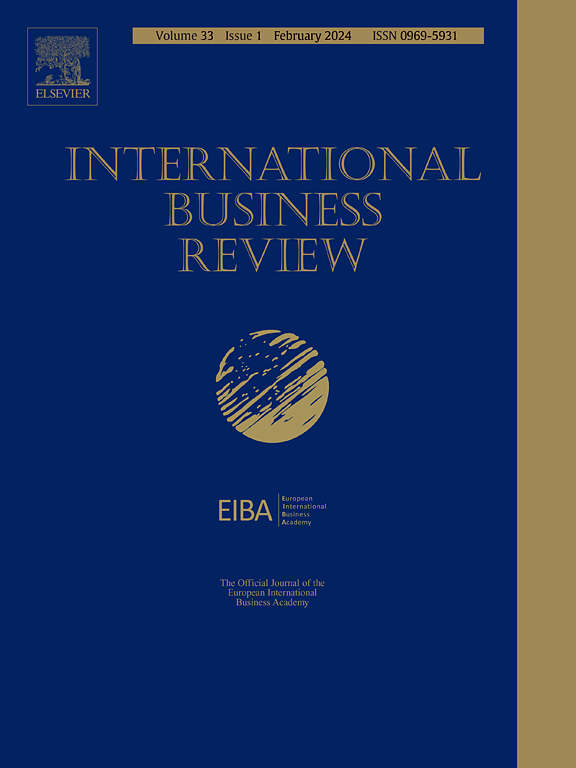外资所有权与研发网络:研发合作的地理和组织接近性
IF 6.1
1区 管理学
Q1 BUSINESS
引用次数: 0
摘要
外国直接投资使公司能够利用外国投资者广泛的国际网络,潜在地获得比国内公司的竞争优势,并在研发合作中发挥独特的作用。为了探讨外资所有权对企业研发合作伙伴选择的影响,本研究主要关注研发合作的两个关键维度——合作伙伴的区位和团队成员,以及研发网络的两个方面——广度和深度。合作伙伴的位置考察了合作伙伴之间的地理邻近性,而共享的业务群组成员则符合组织邻近性的概念。利用2001年至2017年在比利时进行的两年一次的研发调查,我们发现外资企业比内外资企业更有可能参与各种形式的研发合作,并保持更广泛的研发网络,尤其倾向于国际和集团内合作。研究结果表明,外资所有权有助于超越地理邻近性,但限制了企业在研发合作中的组织邻近性,从而重塑了企业的研发合作格局。本文章由计算机程序翻译,如有差异,请以英文原文为准。
Foreign ownership and R&D networks: Geographic and organizational proximity in R&D cooperation
Foreign direct investment (FDI) enables firms to leverage the extensive international networks of foreign investors, potentially gaining a competitive advantage over domestic-owned firms and assuming distinct roles in R&D cooperation. To explore the effect of foreign ownership on firms’ choice of R&D partners, this study focuses on two key dimensions of R&D cooperation—partners’ location and group membership—and two aspects of R&D networks—the breadth and depth. Partners’ location investigates the geographic proximity between cooperating partners, while a shared business group membership fits the concept of organizational proximity. Using the biennial R&D survey from 2001 to 2017 conducted in Belgium, we find that foreign-owned firms are more likely to engage in various configurations of R&D cooperation than domestic-owned firms and maintain more extensive R&D networks, with a particular preference for international and intra-group cooperation. The findings indicate that foreign ownership helps to transcend geographic proximity but constrains firms to organizational proximity in R&D cooperation, thus reshaping the R&D cooperation landscape for firms.
求助全文
通过发布文献求助,成功后即可免费获取论文全文。
去求助
来源期刊

International Business Review
BUSINESS-
CiteScore
14.10
自引率
6.90%
发文量
95
审稿时长
62 days
期刊介绍:
The International Business Review (IBR) stands as a premier international journal within the realm of international business and proudly serves as the official publication of the European International Business Academy (EIBA). This esteemed journal publishes original and insightful papers addressing the theory and practice of international business, encompassing a broad spectrum of topics such as firms' internationalization strategies, cross-border management of operations, and comparative studies of business environments across different countries. In essence, IBR is dedicated to disseminating research that informs the international operations of firms, whether they are SMEs or large MNEs, and guides the actions of policymakers in both home and host countries. The journal warmly welcomes conceptual papers, empirical studies, and review articles, fostering contributions from various disciplines including strategy, finance, management, marketing, economics, HRM, and organizational studies. IBR embraces methodological diversity, with equal openness to papers utilizing quantitative, qualitative, or mixed-method approaches.
 求助内容:
求助内容: 应助结果提醒方式:
应助结果提醒方式:


